Crowns and Bridges Midtown Manhattan
To book a time with Dr. Randhawa, schedule a new patient visit by booking online!
|
OR
|
CALL US AT
Helping Build Your Teeth Back up
Dental crowns are individual caps that fit over the entire surface of a damaged tooth. They are used to provide additional strength and support to restore a tooth that is lacking adequate tooth structure. Crowns can also be part of another dental restoration called a dental bridge. Dental bridges are made up of two crowns and a fake tooth, or pontic, in between them. The two crowns act as anchors for the fake tooth and the fake tooth spans over a gap left by a missing tooth.
Did You Know?
Ancient Italians were the first civilization to use dental crowns as a means of restoring teeth. Called the Etruscans, they used gold, ivory, and bones to repair and restore damaged teeth.
Frequently Asked Questions:
Do I Need a Dental Crown or Bridge?
You may need a dental crown if you have a tooth that is broken, cracked, or otherwise damaged. You may also need a dental crown if you have a tooth with large areas of decay, a large filling, or if your previous filling has failed. In some cases, a root canal may be required if the decay has reached the pulp layer. After a root canal, dental crowns are often used to provide extra support to the tooth. Finally, you may need a dental crown if you have misshapen or stained teeth.
You may need a dental bridge if you have a missing tooth surrounded by two healthy adjacent teeth. Dental bridges are ideal to restore the aesthetics of your smile, as well as speaking and eating function. They also help to maintain the shape of your face and a proper bite, as well as prevent the surrounding teeth from moving.
For more information or to schedule service, call us at (212) 575-7740 or visit our contact page.
What Types of Dental Crowns Are Available?
While the structure of dental crowns is consistent, they can vary depending on the materials they are made from. Dental crowns can be stainless steel, metal, porcelain fused to metal, all-resin, or all-ceramic/all-porcelain.
Stainless steel dental crowns are generally used in children on baby teeth or as a temporary crown. For a permanent crown, metal is a more likely option. Metal crowns can be made from gold, platinum, or base metal alloys (cobalt chromium or nickel chromium. Porcelain fused to metal (PFM) crowns have a metal base with a ceramic exterior for a strong, but natural look.
All-resin crowns lack metal and are made from dental composite resin, which can be matched to the color of your teeth. All-ceramic/all-porcelain crowns can also be matched to your teeth’s natural color and provide a stronger alternative to all-resin.
How Do I Know Which Type of Dental Crown To Choose?
Each different type of dental crown has its own unique pros and cons. For example, metal crowns last longer and are extremely durable, however they are also noticeable. Conversely, ceramic and porcelain crowns are highly aesthetic and ideal for those with metal allergies, however they may not last as long as metal crowns.
During your consultation, the various types of dental crowns will be discussed in order to help you find the best dental crown for your individual needs. Some factors that may determine what type of dental crown is best for you can include: whether or not you have a metal allergy, your aesthetic goals, your budget, and the location of the affected tooth.
What Types of Dental Bridges Are Available?
While crowns all have a similar structure, the different types of dental bridges all have different structures. Currently, there are four different types of dental bridges: traditional, cantilever, Maryland, and implant-supported.
A traditional dental bridge is made up of two dental crowns used as anchors with a fake tooth or teeth in the middle. This is one of the most common types of dental bridges. A cantilever bridge is similar, however only uses an anchor crown on one tooth adjacent to the missing tooth. Because cantilever bridges can put too much strain on the anchor tooth, they are not often recommended. However, they can be used towards the back of the mouth if needed.
A Maryland dental bridge uses the same structure as a traditional dental bridge, however instead of using dental crowns to anchor the bridge, it uses a metal framework that is bonded to the backs of the two teeth on either side of the gap. Finally, an implant-supported dental bridge uses the same structure as a traditional bridge, but with dental implants serving as the anchor teeth.
How Is a Dental Crown or Bridge Placed at Midtown Dental Care?
To place a dental crown or bridge, two appointments are necessary. The first appointment is used to take dental impressions and prepare your tooth or teeth. Dental impressions are essential to make a mold of your mouth that is sent to a dental laboratory. The dental laboratory will then use this information to custom fabricate your dental crown or bridge.
Your tooth or teeth will also need to be prepared for the placement of a crown or bridge. To accomplish this, your mouth will first be anesthetized to keep you comfortable. Then, any decayed tissue is removed and the remaining tissue is reshaped. This will need to be repeated on every tooth that is having a dental crown placed. Once the tooth has been shaped, a temporary crown or bridge will be placed to protect the teeth while the permanent restoration is being fabricated.
When the permanent restoration is complete, you will return to our office for a second appointment. During this second appointment, the temporary crown or bridge will be removed, your teeth will be cleaned, and the permanent restoration will be placed.
What Happens After My Dental Crown or Bridge Is Placed?
After your temporary bridge or crown is placed, you will need to be careful not to dislodge it. Temporary restorations are not as strong as permanent restorations, so you will temporarily need to avoid hard, sticky, or chewy foods, and chewing on the same side as the restoration. Once your permanent restoration is placed, you can resume your usual routine.
For more information or to schedule service, call us at (212) 575-7740 or visit our contact page.
Our Restorative Services
Contact Us Today
For more information or to schedule service, call us at (212) 575-7740 or click the button below to contact us online.
Frequently Asked Questions
-
What are your business hours?
At Midtown Dental Care, our office is open during the following hours:
Monday-Friday: 10:00 am -6:00pm
Saturday-Sunday: Closed
-
What types of payment options do you accept?
One of Midtown Dental Care’s main goals is to ensure that we can provide quality services for a number of people. In order to ensure that we can help as many people as possible and accommodate everyone, we accept a wide variety of payment options. These include but are not limited to:
- Aetna
- Anthem Blue Cross Blue Shield
- Careington
- Cigna
- Connection Dental
- Delta Dental
- Empire Blue Cross Blue Shield
- GEHA
- GHI
- Guardian
- Humana
- Maverest Dental Network
- MetLife
- Principal Financial Group
- United Concordia
- UnitedHealthcare
This also includes CareCredit and any forms of online payment. However, we do not accept HMO or DMO plans.
-
Is Midtown Dental Care a part of any specific associations or organizations?
Midtown Dental Care is an avid member of both the dental community, and the New York community. That is we are proud to mention that we have ties to the following associations/organizations:
- New York State Dental Association
- ADA
- Academy of General Dentistry
- American Academy of Cosmetic Dentistry
- Invisalign Provider
-
How often should I visit the dentist?
According to the American Dental Association standards, every individual should visit the dentist once every six months, or twice annually. This begins when a child has their first tooth, and lasts for their entire lifetime. It is very important to attend these appointments to ensure good dental health and minimize the chances of larger dental problems later.
-
Should I choose traditional braces or Invisalign?
Each and every patient is different with a unique case. This means that, for some patients, Invisalign is the best choice. For other more complex cases, traditional braces may be the most effective dental solution. In order to find out whether traditional braces or Invisalign is best for you, give the professionals at Midtown Dental Care a call. We can discuss with you the advantages and disadvantages of each option, so you can feel confident in your choice.
-
What are the benefits of cosmetic dental services?
Cosmetic dental services work to improve the physical appearance of a patient’s smile. A patient’s smile can be enhanced with the following services:
The benefits of cosmetic dental services are vast. These services make a patient’s smile more appealing, which can then help to boost confidence and self-esteem.
-
Do you offer dental services for the whole family?
Yes! At Midtown Dental Care, we can provide comprehensive dental services for the entire family! It is important to start going to the dentist at a young age and ensuring that children learn young that they should be visiting the dentist twice a year, brushing and flossing at least twice a day, etc.
-
What counts as a dental emergency?
It can be tough to identify whether or not your situation is a dental emergency. However, it is significant to remember that most dental emergencies involve pain, swelling, and/or bleeding. Some of the most common dental emergencies that the staff at Midtown Dental Care treat on a consistent basis include root canals, toothaches, broken teeth, and any other type of tooth pain.
-
Why should I choose Midtown Dental Care for my family’s dental health needs?
Midtown Dental Care provides dental services to clients of all ages. Our staff utilizes digital dentistry, as well as other industry standard equipment and methods, to ensure that our patients receive the best dental care possible. The industry is always changing, so our staff works hard to stay up to date on the newest dental technologies.
Before & Afters
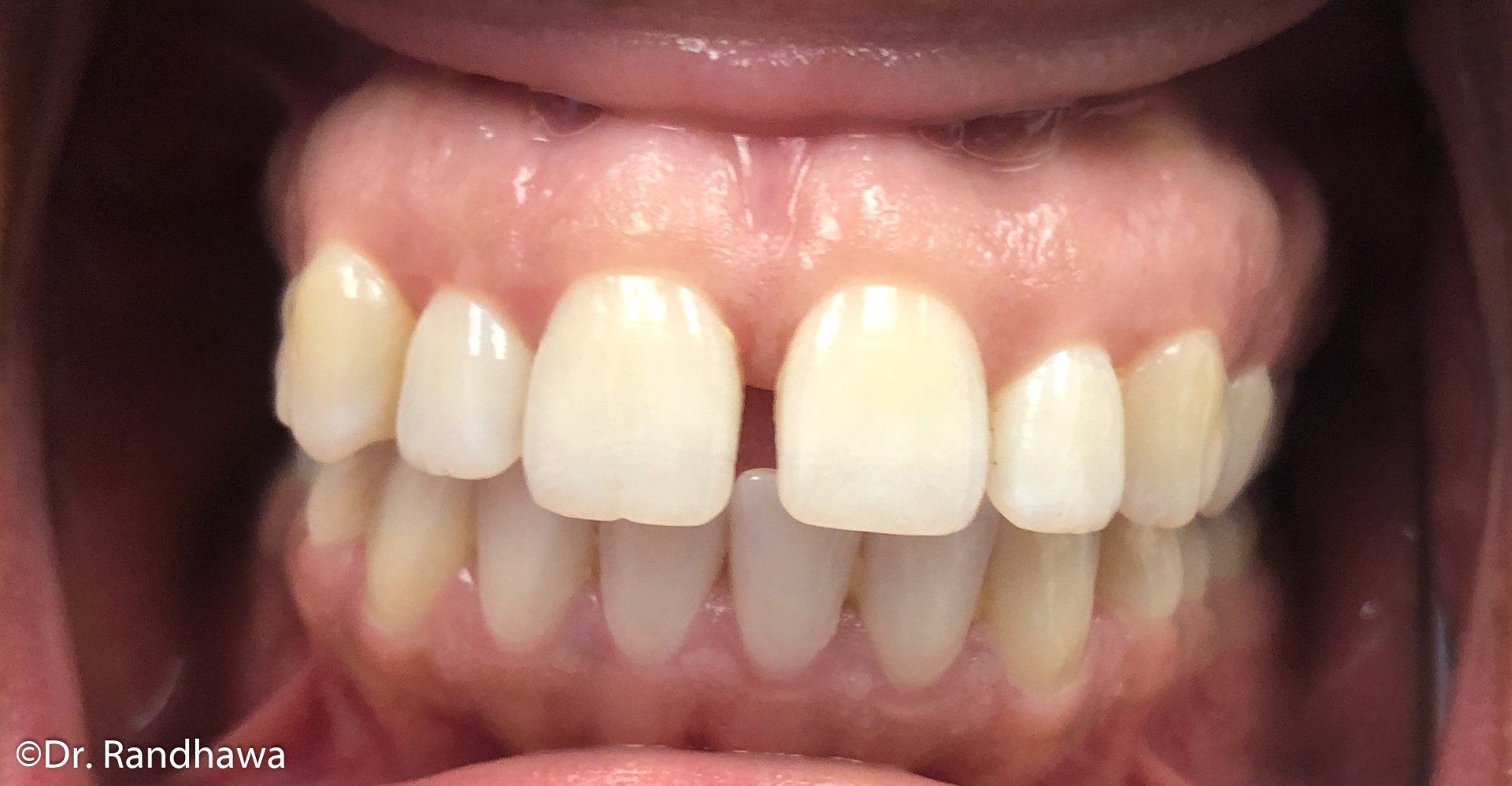
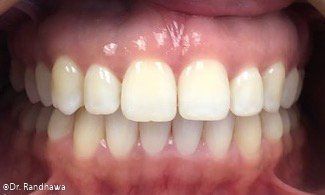
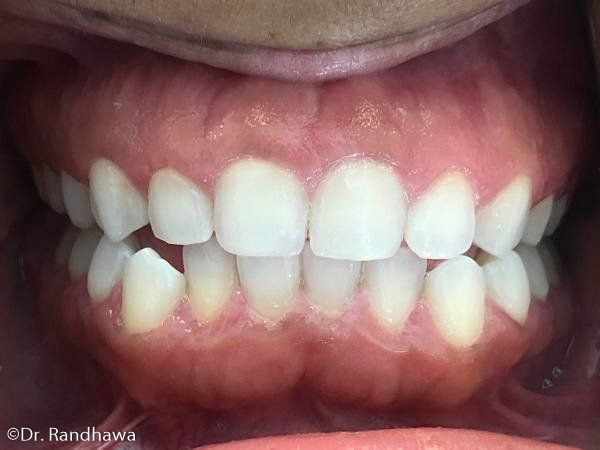
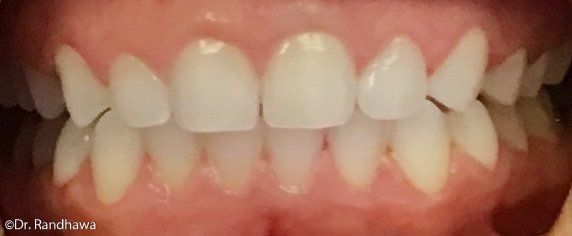
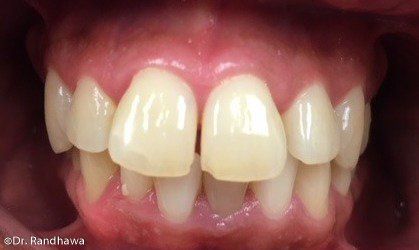
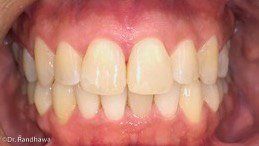
Why Choose Midtown Dental Care?
Accepting All Major Insurance Providers
Experienced and Professional
General and Cosmetic Dentistry
Centrally Located in Times Square
See What Our Satisfied Patients Have to Say
-

" I have had a great experience at Midtown Dental Care. Dr. Randhawa and the rest of the staff are extremely professional. During my first visit, I had a complete evaluation followed by a thorough discussion regarding my treatment plan. I loved the use of technology to help me understand the condition my teeth were in. I was able to complete the treatment plan and feel much better now. Midtown Dental Care helped me regain control of my oral health. Very much appreciated!"
- Hannah M.
Read All Reviews -

"For the first time in my life I actually enjoyed my dental visit. Dr Randhawa is a delight: highly skilled, sensitive to her patients, and personally cares. She conveyed optimism to me about our procedure, explained it entirely in advance, and then successfully accomplished exactly what she prepared me for. I cannot recommend her highly enough and will be referring my family and friends to her!"
- William B.
Read All Reviews -

"I love this office and Dr. Jaskaren have been coming here for years for all of my dental needs. It’s conveniently located in midtown. Stephanie and Jason are so helpful working around my hectic work schedule and making sure I stay on top of all of my appointments. I’m confident I’ll be coming here for years to come."
- Tarrie A.
Read All Reviews -

“AMAZING DENTIST TEAM EVER!!!!. The staff was awesome as well as the doctor. They were so welcoming and made my visit go smooth. I was able to get an appointment for an infection tooth same day. I was scare but with their sweetness and kindness I felt relieved. I sure will come back and i will certainly tell all my friends, family, or all about this place. Thank you guys!!!”
- Maria J.
Read All Reviews -

“After recently moving to the city from Texas, I realized I needed to find a dental office that cares for my health. This office is that and more. This staff has been extremely transparent, caring and honest during my visit here which I believe is extremely important when finding a primary dentist. Sarah was my hygienist and made me feel comfortable during my routine clean up. Stephanie and Jason were everso friendly, answered all the questions, and made sure I walked out without any ounce of doubt or confusion.”
- Parth B.
Button
Request an Appointment
For more information or to schedule an appointment, call us at (212) 575-7740 or complete the form.
Contact Us
We will get back to you as soon as possible.
Please try again later.
Our Contact Information
Office Hours
- Mon - Fri
- -
- Sat - Sun
- Closed
Our Services
Quick Links
Office Information
- Sat - Mon
- Closed
- Tue - Fri
- -
Accepted Payments
Contact Us
Midtown Dental Care - Dr. Jaskaren Randhawa

